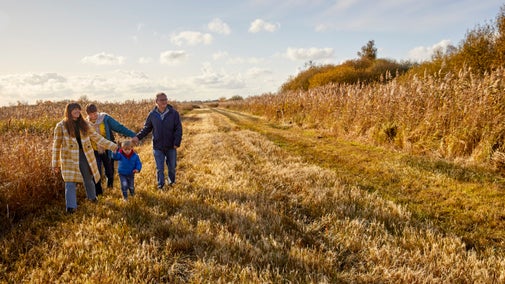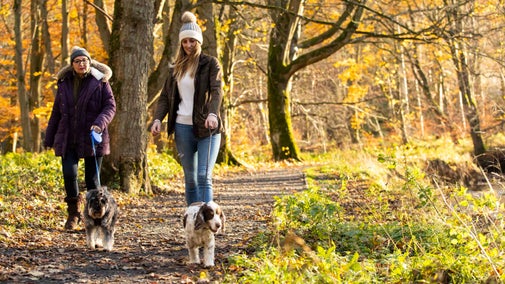
Discover more at Wicken Fen
Find out when Wicken Fen is open, how to get here, things to see and do and more.

Whether you're a local dog walker who comes for a wander every day, or you're visiting from further afield, we welcome responsible owners and their dogs under close control in the wider nature reserve. To help us ensure our visitors, dogs and wildlife get along together, there are a few do’s and don’ts to take note of if you’re bringing your dog with you.
We’ve been working on making it easier for you to find out how dog-friendly your visit will be before you and your four-legged friend arrive. To help with this, we've created a new pawprint rating system and given all the places in our care a rating. You can find this information in the National Trust members' handbook.
Wicken Fen is a two pawprint rated place.
These places have water bowls, dog bins and dog-friendly walks. You’ll be able to take your dog into some areas, but not everywhere. If there’s a food and beverage outlet, you can have a cup of tea with them, probably outside. Read on to discover exactly where you can take your dog. Wicken Fen is a two pawprint rated place.
There are miles of paths to explore with your dog around Baker's, Adventurers' and Burwell Fens, as well as beyond. See our map or speak to a member of our friendly visitor welcome team for more information about these wider reserve paths.
Dogs on a short lead are welcome inside the Visitor Centre and shop, as well as the Docky Hut Café when you're choosing and ordering your food. Please use one of our picnic benches outside if eating with your dog. (Inside seating may also be available in the Visitor Centre for enjoying your café food with your dog.)
We only allow assistance dogs on the Sedge Fen, as this area is home to several vulnerable, protected species. This includes the Boardwalk, woodland walk and summer nature trail.
Please do not let your dog jump in the water, as nests and birds are easily disturbed. Another potential issue, less obvious perhaps but with a massive impact, is the devastating effect your dog’s flea and tick treatment can have on the rich freshwater invertebrate life of the Fen.
When walking your dog, please ensure that it stays on the path with you at all times.
Our Fen Cottage is too small for your dog to visit with you, but we welcome dogs in the garden, where they can easily be secured while you pop inside.
We are unable to take dogs (other than assistance dogs) aboard our boat, the Mayfly.
To help us ensure our visitors, dogs and wildlife get along together, we ask that you:
Dogs must always be under close control while visiting Wicken Fen. But what does close control mean?
Wicken Fen has several important designations, including National Nature Reserve, Site of Special Scientific Interest (national designations), a Special Area of Conservation (European designation) and a Ramsar Site (an international wetland designation). The Fen is one of Europe's most important wetlands; home to over 9,000 recorded species, including many rare plant, bird and dragonfly species.
Dogs can be very disruptive to birds, other wildlife and livestock. Any dog will be viewed by wildlife as a predator. Ground-nesting birds are particularly vulnerable to disturbance, and can be forced from their nests, leaving eggs or chicks exposed. The RSPB states that over half of England’s most threatened breeding species nest on or near to the ground. By sticking to paths, watching your step and keeping dogs on a short lead, you can give rare ground-nesting birds the best chance of survival.
We ask that you dispose of your dog’s poo in one of the designated dog waste bins. Dog poo damages the soil, plants and wildlife that make the Fen so special. Clearing up after your dog will protect the area, as well as preventing the spread of diseases that can affect people, other dogs and grazing animals.
Through careful conservation, the Fens continue to be crucial for our native wildlife. To ensure that people, wildlife and livestock can live in harmony, we’re working hard to help visitors understand more about the landscape and how they can help protect it and the plants and animals that live here. Please help us to protect Wicken Fen and walk your dog responsibly.
Wicken Fen is one of the participating places in the National Trust's Pooch Passport scheme this winter.

Find out how our rangers Ajay Tegala and Carol Laidlaw help to look after Wicken Fen by keeping their dogs under close control.
'My work as a ranger at Wicken Fen has given me a real insight into how we can all enjoy the wildlife and countryside, without having a detrimental effect through our actions. Adult birds will leave a nest if disturbed, and even a short time away from their eggs or chicks can result in them becoming too cold, as well as chicks being left unfed and unprotected. They are left more vulnerable, so even if it isn’t a dog, it makes it easier for other predators to take advantage.
'At the Fen, many of the nests are in the reeds and along the edge of the waterways, so even if it is tempting for your dog to go swimming, this too can be the difference between a reed warbler, cuckoo or duckling surviving – or not. Species such as cuckoos are endangered, it would be a real loss if their call was no longer heard at Wicken Fen.'
'I have been looking after the grazing herds of Highland cattle and Konik ponies at Wicken Fen for 20 years. For many years my old dog Tic Tac accompanied me, but I have now got a new young dog whom I am training. For visitors with dogs it is important that you don’t let your dog chase or frighten the grazing herds, as the animals may become stressed and upset, especially if there are young present. And of course, this is the time of year when most of our foals and calves are born.'
We’ve worked with our partner Forthglade to come up with this Canine Code, which helps to make sure everyone can enjoy their day:
Our definition of close or effective control is:

Find out when Wicken Fen is open, how to get here, things to see and do and more.

We've partnered with natural pet food maker Forthglade so that you and your dog can get even more out of the special places we care for.
Wicken Fen was the first nature reserve to be managed by the National Trust. Today it’s one of Europe's most important wetlands, with over 10,000 recorded species.

Explore the fens on two wheels or on foot. Enjoy an easy family ride to see Konik ponies or discover the wildlife in the wider reserve.

If outdoor activities and learning about nature sound like a good day out for your family, Wicken Fen is the right place for you. Discover everything you need to plan your family day out, from events and activities for kids to hiring bikes.

Discover the best places for you and your dog to explore, from coastal adventures and dramatic mountains to more leisurely walks and gardens to visit nearby. Plus, find information on dog-friendly cafés and read our Canine Code.
